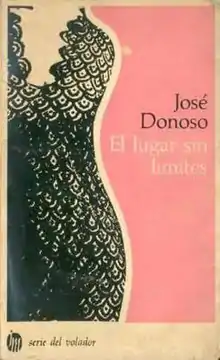Hell Has No Limits
Hell Has No Limits (Spanish: El lugar sin límites, "The Place Without Limits") is a 1966 novel written by Chilean José Donoso. The novel is set south of the Chilean capital, Santiago, in a small town near the regional center of Talca. It tells the story of a bordello, and details the prostitutes' way of life. The main character is Manuela, the transgender woman who owns the bordello. A number of other memorable characters are introduced. The novel was well received, and Donoso himself considered it his best work: "the most perfect, with fewest errors, the most complete".[1]
 First edition (Spanish) | |
| Author | José Donoso |
|---|---|
| Original title | El lugar sin límites |
| Translator | Suzanne Jill Levine |
| Country | Chile |
| Language | Spanish |
| Publisher | Sun & Moon Press |
Publication date | 1966 |
Published in English | 1972 |
| Media type | Print (paperback) |
| Pages | 142 |
| ISBN | 1-55713-275-5 |
Title
The title Hell Has No Limits refers to a line in Marlowe's play Doctor Faustus, where the character Mephistophilis says:
- Hell hath no limits, nor is circumscrib'd
- In one self place; for where we are is hell,
- And where hell is, there must we ever be.
- —Doctor Faustus, Act II, scene i, line 118
Film adaptation
In 1978, the book was made into a film of the same name.
Editions available
- Carlos Fuentes / José Donoso / Severo Sarduy (1972). Triple Cross: Holy Place / Hell Has No Limits / From Cuba with a Song, Dutton.
- Donoso, José (1995), Hell Has No Limits, Los Angeles: Sun & Moon Press, OCLC 33207281. Trans. Suzanne Jill Devine.
- Donoso, José (1999), Hell Has No Limits, Los Angeles: Green Integer, OCLC 42949208. Trans. Suzanne Jill Devine.